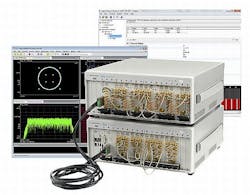Multi-channel PXI-based test solution for complex carrier aggregation introduced by Agilent
SANTA CLARA, Calif., 21 July 2014. Agilent Technologies Inc. in Santa Clara, Calif., is introducing the LTE/LTE-Advanced multi-channel PXI-based test solution to accelerate the setup of multi-channel test system configurations and enable engineers to gain deeper insight into complex carrier aggregation and spatial multiplexing MIMO designs.
Designing and characterizing components and RF subsystems for base stations, microcells, picocells, repeaters and mobile devices is becoming more complex as multi-antenna designs require increasingly complex multi-channel test configurations, company officials say.
Agilent's test solution provides tools to generate complex LTE/LTE-A multi-channel/MIMO waveforms and analyze several channels in the frequency and modulation domains simultaneously.
The graphical user interface can shorten the time it takes to set up a test configuration. In addition, measurement setups are optimized for LTE/LTE-Advanced MIMO and carrier aggregation configurations.
The test solution's chassis backplane trigger tool configures and routes the backplane triggers for proper time synchronization in MIMO configuration for to two PXI Express chassis. Time-synchronized MIMO testing (2x2 or 4x4) is accomplished using Agilent's RF M9381A PXI Express vector signal generators and M9391A PXI Express vector signal analyzers, which provide less than 0.38 percent EVM and less than 20 nanoseconds time synchronization between channels.
In addition, the to 160 MHz signal generation and analysis bandwidth, the test system is capable of supporting a wide variety of LTE-Advanced carrier aggregation applications.
For more information contact Agilent online at www.agilent.com.
Related content
Agilent spins off electronic test and measurement businesses into new company named Keysight Technologies
Analyzer for printed circuit board impedance test in manufacturing introduced by Agilent
Agilent Technologies accelerates defense simulations, harnesses compute clusters for fast system-level validation and test.

